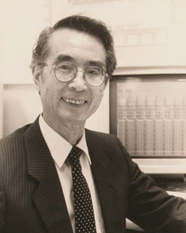Entrepreneurship Endowment to Support Innovation

Prof. Jimmy H. C. Lin
|
Anchen Lin, the wife of Hung Chang "Jimmy" Lin (1919-2009), a beloved longtime professor in the Department of Electrical and Computer Engineering (ECE), has made a gift to the Clark School to endow a new fund in her husband’s name. The purpose of the Jimmy Lin Endowment for Entrepreneurship is to provide annual awards to students, staff, and faculty who transform their ideas into innovations through invention and technology commercialization.
"We are most grateful for this generous gift from Mrs. Lin," said ECE Professor and Chair Patrick O'Shea. "This new fund will honor Professor Jimmy Lin's memory by promoting the spirit of entrepreneurship among our faculty and students."
In 2008, Prof. Lin endowed the Jimmy Lin Fund for Innovation and Invention within ECE with a goal to promote innovation among students, staff and faculty by stimulating, encouraging and rewarding the invention and patenting process.
With her recent gift, Anchen Lin followed Prof. Lin’s wish to expand the original fund and established the Jimmy Lin Endowment for Entrepreneurship. Through the Hung Chang and Anchen Wang Lin Fund, this endowment will promote entrepreneurship by supporting the following new awards and scholarships: The Jimmy H. C. Lin Entrepreneurship Competition Award, The Jimmy H. C. Lin Invention Competition Award, The Jimmy H. C. Lin Entrepreneur Internship Award, and The Jimmy H. C. Lin Graduate Scholarship for Entrepreneurship.
About the Awards
The Jimmy H. C. Lin Entrepreneurship Competition Award will promote entrepreneurship in the ECE Department by providing an award to the student/staff/faculty team that achieves the highest level of recognition in the annual University of Maryland Business Plan Competition.
The Jimmy H. C. Lin Invention Competition Award will promote inventions in the ECE Department by providing an award to the faculty/staff/student team that achieves the highest level of recognition in the annual University of Maryland Invention of the Year competition.
The Jimmy H. C. Lin Entrepreneur Internship Award will help students in the A. James Clark School of Engineering develop valuable professional experience by providing an award to support student internships with start-up companies in the University of Maryland-China Research Park.
The Jimmy H. C. Lin Graduate Scholarship for Entrepreneurship will provide support for graduate students in the ECE Department who completed their undergraduate studies at Shanghai Jiao Tong University in China. This award will encourage students from Prof. Lin’s alma mater to attend the University of Maryland.
Each of the award recipients will be identified by the chair of ECE with the help of an ad hoc committee selected by the chair. An award ceremony will be held each year for the recipients of these awards. More information about the new awards created by the endowment can be found at www.ece.umd.edu/lin.
About Professor Jimmy H. C. Lin
A dedicated and popular instructor who missed only one class in over 20 years of teaching, Lin joined the University of Maryland as Professor of Electrical Engineering in 1969. He retired in 1990, and subsequently served as Professor Emeritus. Well known to his colleagues for his abundant energy, Lin’s career spanned more than half a century and was punctuated with many honors, awards, and inventions.
Lin received a B.S. in electrical engineering in 1941 from Chiaotung University in Shanghai, China. He was an avid tennis player, and made his way through college on a tennis scholarship. Before leaving China in 1947, Lin was an engineer at the Central Radio Works and Central Broadcasting Administration.
In the United States, he received an M.S. degree in 1948 from the University of Michigan and Doctor of Electrical Engineering in 1956 from the Polytechnic Institute of Brooklyn. He was one of the first scientists at RCA Laboratories to work on transistor circuit development. The technology evolved rapidly, and he was the first inventor to incorporate p-n-p or complementary integrated circuits. His industrial experience also included research and development positions at the Hytron Division of Columbia Broadcasting Systems and Westinghouse Electric Corporation.
His most well known contribution is the invention of the lateral transistor that is used in most linear integrated circuits and digital integrated circuits. His early study of the temperature effects led to the use of diode compensation configuration, which is now widely used in transistor amplifiers. It is a little known fact that the output (or Totem) driver used to control the speakers in every audio system was invented by Professor Lin. Lin was inducted into the Clark School of Engineering Innovation Hall of Fame at the University of Maryland in May 1990 in recognition of his significant inventions and contributions in semiconductor devices and integrated circuits.
Lin was the holder of 57 U.S. patents, and the author or co-author of 170 technical papers and three books. He was elected a Fellow of the Institute of Electrical and Electronics Engineers (IEEE) for contributions to semiconductor electronics and circuits and pioneering of integrated circuits. In 1978, IEEE presented him with the J.J. Ebers Award.
In addition to serving as professor and professor emeritus at the University of Maryland, he was a part-time adjunct professor at the University of Pittsburgh, visiting lecturer at the University of California at Berkeley.
For more information about the Jimmy Lin Endowment for Entrepreneurship, visit www.ece.umd.edu/lin.
Related Articles:
Trio of Maryland Engineers Named to Forbes’ 30 Under 30 Lists
UMD Startup Shell Supported by ECE Alumna
UMD Initiative to Award Up to $2M for Student Solutions to Grand Challenges
Alum Fatima Mikdashi Named 2022 Marshall Scholarship Finalist
Mehr Gift Establishes Two Funds at UMD
The Epic World of Tim Sweeney
Igniting Entrepreneurship
Meet the Alumnus Who Brought Stormwater Management to Silicon Valley
Two Clark School Students Named University Innovation Fellows
Clark School Graduates Team from NSF's Innovation-Corps
April 25, 2011
Prev
Next
|
|


